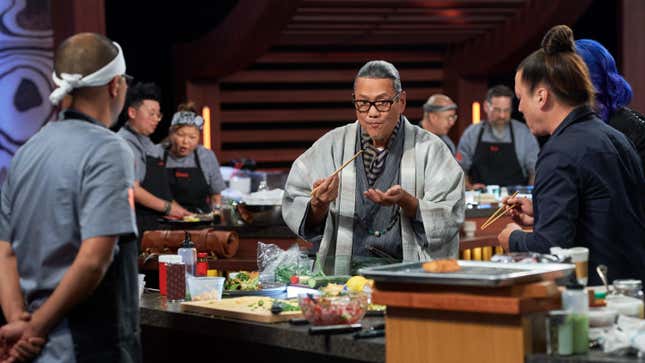
Earlier this month, the Roku Channel debuted Morimoto’s Sushi Master, the latest entry in its (surprisingly broad) catalog of culinary content. The competition show’s formula is as simple and delicious as a plate of sashimi: Eight chefs, a series of special ingredients, and various challenges, spread across six episodes. But like a good plate of raw, barely dressed fish, there’s a layer of complexity to Sushi Master that I frankly didn’t expect.
Both the titular host, Iron Chef legend Masaharu Morimoto, and the show’s promotion by J. Kenji López-Alt provided a reason to tune in, but by the end of the first episode, my “production” brain was tingling. Recall how humans experience taste: through our tongues, noses, and eyes. And while I managed not to lick the screen over the course of the competition, the pretty colors and the overall flavor of this subtle, skillful production had me hooked from the get-go.
Oh, and ATTENTION ALL POTENTIAL VIEWERS: Do not Google “Morimoto’s Sushi Master” unless you’re looking to have the finale spoiled for you. The winner is named in one of the first search results, much to my personal chagrin. I had two episodes left when I made this discovery, and I’m still salty about it.
But that’s the thing: I was annoyed because I was invested in the show. And here’s why.
What makes Sushi Master worth watching
Firstly, the team of hosts, and the dynamic between them, is strong. Four personalities anchor the Sushi Master experience: Actor and host Lyrica Okano, judges J. Kenji López-Alt (Serious Eats, The New York Times) and Chef Dakota Weiss (of Bravo’s Top Chef, among others), and Chef Morimoto himself. Okano tackles her role with a good-hearted, goofy enthusiasm, decidedly more along the lines of Alton Brown than something like Is It Cake? Meanwhile, Weiss brings a certain straightforward, no-nonsense credibility to the proceedings, which pairs well with López-Alt’s steadiness and culinary insight.
And, of course, there’s the show’s namesake, Japanese superstar Masaharu Morimoto. He’s a familiar face to those who grew up on Iron Chef, both in its Japanese and American incarnations. But Sushi Master manages to showcase a different side of the man: his surprising playfulness, thanks to a wit that’s as dry as overcooked chicken.
Why Roku’s cooking shows work
The Roku Channel is an interesting venue for a head-to-head cooking competition show. The company has reach, certainly, but nowhere near the production coffers of a Netflix, Hulu, or Amazon Prime. And sushi-grade fish is expensive, to say nothing of the Japanese and specialty ingredients perpetually stocked in the Sushi Master pantry.
But the production team knew where to spend its money, and how to make the most of a small set. The lighting, camera work, sound, and editing are strong, coming together to create a viewing experience that’s both premium and accessible. The feel is less “Kitchen Stadium” and more “Intimate Sushi Bar,” and it avoids the frantic, short-order nature of Chopped.
Overall, it’s an impressive production that transcends a (presumably) less-than-Netflix budget by focusing on what matters most: the hosts, the chefs, and their food.
The best (and worst) parts of Morimoto’s Sushi Master
Just like the food they create, the contestants are vibrant, but almost to the point of excess. The series dedicates significant time to covering their motives and backgrounds, and while they each seem like lovely people, this occasionally became a bit much for me. I generally tune into food competitions for the action, insights, and end products, with the chefs’ personalities sprinkled on as a garnish. But this is purely a matter of personal taste, and I understand why Sushi Master injected as much intimate context as it could, even if the emotion sometimes feels at odds with the staid nature of the judges. Consider this a minor (and largely personal) complaint.
Still, it’s interesting to see how the chefs’ differing backgrounds inform their unique approaches to each challenge, which is exactly what you want in this type of show. It’s easy to pick a favorite contestant or two, but apart from a single moment in the very first episode, it seems that most of the participants are actively rooting for each other, much like The Great British Baking Show.
This shines through in the sushi they create. The contestants’ skill (and occasional failure) pairs well with the show’s excellent photography, creating plates that leap off the screen. Again, this is smart production. Morimoto’s Sushi Master doesn’t need spinning stages, sweeping lights, or full-on orchestral stings to create compelling TV. By keeping things small-scale and focusing on the color of the personalities and the food they produce, the show packs in all the flavor you’ll need.
Season one of Morimoto’s Sushi Master is streaming now, free on the Roku Channel.